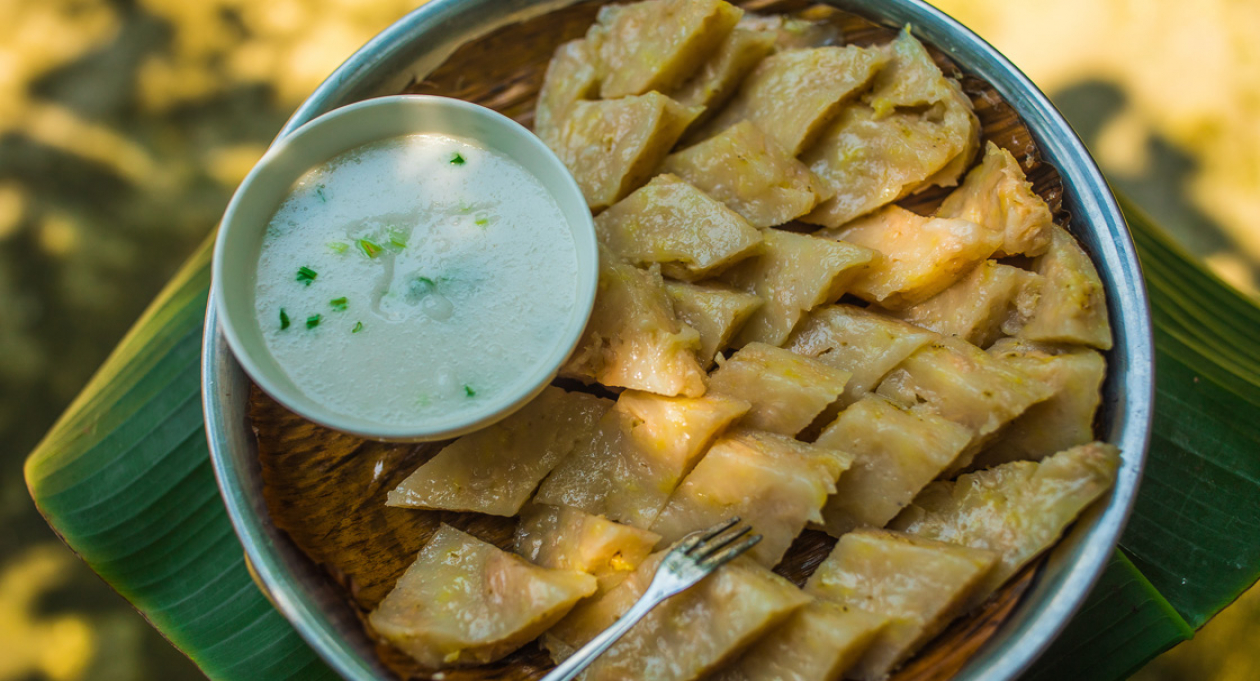With fresh ingredients at the ready and a long tradition of creative cooking, a tasty snack is never far away when you're in Vietnam. Some come with age-old stories, while others take great Vietnamese products and elevate them with a modern twist. From salted egg chips to mung bean cakes, these delicious goodies make fantastic gifts for your loved ones back home.
Mung bean cubes | bánh đậu xanh
A cube of sweet mung bean that melts in your mouth goes perfectly with hot cups of green tea, so much so that when Bảo Đại, Vietnam's last emperor, first stumbled upon this heavenly treat, he allowed the people to print the royal symbol of a golden dragon on the packages. To this day the cubes are often wrapped in the colours of royalty: red and gold.
TIP: You can shop for mung bean cubes and young rice cakes (bánh cốm) at the colourful stores on Hàng Than street in Hanoi's Old Quarter. Look for the pyramids of sweets laid out on the sidewalk.
Coconut candy | kẹo dừa
A trip to the Mekong Delta is not complete without a visit to the coconut candy workshop. Watching the workers chop up strips of coconut candies and wrap them up in rice paper is just as appealing as tasting them right at the source. The milky, rich coconut confections are a specialty of Bến Tre Province, where coconuts are well known for their unmatched sweetness.
Marou chocolate
Made from Vietnam's finest cacao beans, Marou chocolate has won the hearts of travellers from all over. The beans are sourced from six Vietnamese provinces in the Mekong Delta and Central Highlands. With innovative flavours such as ‘Phở Spices' and ‘Popped Rice', Marou ensures every chocolate bar is not just an indulgence but also an exciting foodie adventure.
Peanut and rice paper brittle | kẹo cu đơ
Peanuts covered in molasses and malt sugar are sandwiched between two sheets of rice paper in this unique confection. The stickiness of peanuts and molasses is balanced by the crusty toasted rice papers in every bite. Kẹo cu đơ originated in Hà Tĩnh, a North Central province where people have been making candied peanuts for generations.
Ranchu salted egg chips
Ranchu potato chips and fish skins take the goodness of salted eggs to the next level. To make sure you get the full flavour, the brand uses a traditional salting method with fresh duck eggs from the Mekong Delta that takes months to perfect. For a more unconventional crisp, check out their seasonal breadfruit chips.
Sesame candy | mè xửng
Since the 1950s, foreign merchants who passed by Huế, the imperial capital of Vietnam, have bought sesame candy as gifts for their friends and family back home. Traditionally, Huế locals eat these treats while waiting out the long monsoon rains. Chewing through the stickiness of malt sugar in these snacks requires patience, just like the rain here.
TIP: You can find Thiên Hương, the oldest mè xửng shop in Huế, at 20 Chi Lăng Street. The shop has been in business since 1940.
Crispy rice | cơm cháy
Vietnamese celebrate rice in all its forms. Deep frying rice creates a crunchy texture that goes wonderfully with fluffy strands of pork floss. Add a spoonful of spring onions and dig in! If you can handle the heat, get a bag of spicy crispy rice with chilli flakes. Interestingly, this savoury treat was inspired by scorched rice, the crust of browned rice at the bottom of the pot.
Candied ginger | mứt gừng
When it comes to tea pairings, Vietnamese have some surprisingly perfect creations. Sugar-coated ginger might sound curious at first, but the sweetness compliments the zing of ginger so well, the only way to make it better is to follow with a sip of tea. Locals believe this healthy snack symbolises a life of comfort and happiness.
TIP: Aside from ginger, candied lotus seed, coconut, and kumquat are also popular among Vietnamese. Candied lotus seed is nutty and milky, while candied kumquat is a harmonious blend of sweet and acidic.
Dried fruits | ô mai
A speciality of the capital Hanoi, ô mai is made by mixing dried fruits such as plums, apricots, and peaches with sugar, salt, lime, chili, or ginger. The dried fruits can be sweet or savoury, and deliver many health benefits. Ô mai used to be a rich man's snack in Vietnam hundreds of years ago, but it can now be found in every Hanoian home, especially during Lunar New Year.
Coconut flakes | dừa sấy
On the beach, do like the Vietnamese do and crack open a fresh coconut to eat the sweet, white flesh with a spoon. To bring home some of this goodness, grab a bag of coconut flakes. The crisp, golden-brown flakes are made by toasting thin strips of coconut flesh. A bowl of sweet soup dessert (chè) in Vietnam often comes with these yummy coconut shavings as toppings.




